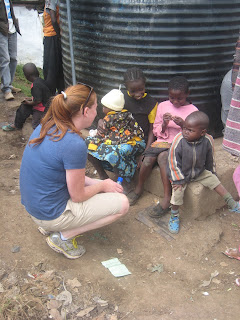Hello again!
This week has been busy... getting down to the real work of getting these facilities to where they need to be! As mentioned last time, Kibera is really hard to describe - so luckily this time I have photos! Admittedly I did not take many (ok, any) of them, so credit goes to our paparazzi photographer (Willy, a Kibera native) and my team mates (Ellen and Nate specifically). Some of the highlights from this week included running a business training, learning how to make soap and practicing hygiene trainings that we will be running at different places throughout the summer.
 |
| A typical view in Kibera - the houses are mostly made from old steel sheets (like in this photo) or from their own version of concrete, which is basically dirt mixed with water. Most families all live in one small room. |
 |
| Ben climbing through a door in Kibera. Gives you a sense of how hard it is to get around in here. As our friend Boniface said to me the other day "you have to be in good physically fitness to live here". And it's true. Pretty much think of it as hiking, through really small spaces, on about 3 feet of compounded trash. |
A view of Kibera from one of the higher villages (read: relatively better off). Does not at all give a sense for the size, but perhaps for the density. That large cylindrical building is actually a biomass energy facility (from what we're told). Basically they burn feces into energy :)
Me, talking with some kiddies. The little one looks a little... skeptical. But at least the other two are smiling!
 |
| Another paparazzi photo. Don;t we look badass? The three Kenyans in the front are Anthony (our project manager), Sadiq (a Kibera native... he runs a facility, but I have mixed feelings about him. He holds a lot of influence in the community but I think his only motivation is money. Can you blame him though?) and |
 |
| Kiberan kiddies. Love them! They were holding on to the fence and jumping on these steel sheets... making SO much noise, and loving every minute of it. If there's one thing that stays the same the world over, it's kids playing. That and smiles - the best currency. |
 |
| The team! From left: Renee, Ellen, Nate, Anthony, me, Boniface, Ben and Chris. Chris is the water supplier for all of Silanga.... some might call his position 'water mafia' but we take a different view - he is the reason this entire village has water and (i think) a great guy. One of my goals for this summer is the write a paper on how water governance really works in this slum. People's (academics) perceptions and assumptions seem to be a lot different than what we have experienced. |
 |
| Checking the water level in the tanks at the Kasinga facility. A very scientific method of tapping until it sounds hollow. Since water only flows into Kibera 1 or 2 days per week we are putting these huge tanks in at all of the facilities... that way, we will always have water available. |
 |
| A good view of one of our facilies. Note the trash. This is barely anything compared to some of the other locales. |
 |
Another facility - Jola. This one is run really well - note the messaging on the tank. Smart! We will be replicating that.
|
 |
| Discussing plans at Okere facility. High hopes to get this one running well with hot showers - lots of families right nearby, prime location for great use and improved hygiene. |
 |
| Soap making class with the hygiene club at Undugu school in Silanga. We'll be doing a full hygiene training with these guys next week. |
 |
| Helen showing the kids the soap routine. She is an awesome success story, the kind we crave to be true when we study development. Last year this project taught Helen how to make soap. She hustled her way through the last year, making it and selling it at a profit around the community. (Soap is expensive and hard to come by in Kibera - but this method is cheap, fast and effective.) Last month she used her profits from soap selling to open her own hair salon!! She wants to do my nails soon :) |
 |
| More of the soap training. |
 |
| Soap! The plan is for the hygiene club at Undungu to make their own soap - both to keep in their bathrooms and sell locally. Their profits (the way we've worked it out) will allow them to continue purchasing the materials to make the soap, provide toilet paper in their facilities.... and have 400 shillings leftover per batch - enough for each student in the club to make 10 shillings off each batch. |
We are all really excited for this weekend - tomorrow morning we are headed out to a rural town called Meru. It is the hometown of our project manager here, Anthony, so he will be showing us around. We'll be visiting Meru National Park and Mount Kenya, so stay tuned for (hopefully) awesome wildlife photos next week.
Thanks for reading!















No comments:
Post a Comment